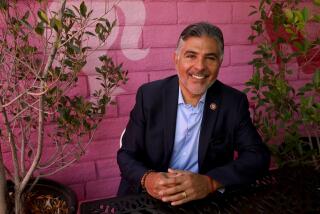Bush Speech Links Politics, Terror Fight
BIRMINGHAM, Ala. — President Bush angrily accused Democratic leaders Thursday of misrepresenting a recently declassified intelligence report, and said they favored policies that would increase the nation’s vulnerability to terrorist attacks.
Addressing Republican Party contributors, the president melded politics, a defense of the war in Iraq and the anti-terrorism fight to a greater extent than he had recently.
His remarks set off an equally angry response from a leading Democratic senator.
“Five years after 9/11, the worst attack on the American homeland in our history, the Democrats offer nothing but criticism and obstruction, and endless second-guessing,” Bush said in a speech that repeatedly brought the audience of several thousand at the Birmingham convention center to its feet.
“The Democrats can’t have it both ways,” he said, accusing his political opponents of quoting selectively from declassified sections of a recent National Intelligence Estimate on the capabilities of Islamic extremists. “Either they believe that Iraq is a distraction from the war on terror or they agree with the intelligence community and the terrorists themselves that the outcome of Iraq is important in the war on terror.
“Truth is, the Democrats are using the NIE to mislead the American people and justify their policy of withdrawal from Iraq,” Bush said.
The president has been speaking frequently about the war, and addressing large numbers of Republican contributors, but Thursday’s speech brought together the two most difficult issues he is facing during his sixth year in office -- the war and the challenge of keeping GOP majorities in the House and Senate -- more openly than he had before.
He also singled out statements by Rep. Jane Harman of Venice and Sen. John D. Rockefeller IV of West Virginia, the top Democrats on the House and Senate intelligence committees, although he quoted neither by name. Aides said later that they were the two Democrats he was referring to.
Referring to Harman, Bush said: “She said, ‘The president says that fighting them there makes it less likely we’ll have to fight them here. The opposite is true.’ She went on to say, ‘Because we are fighting them there, it may become more likely that we’ll have to fight them here.’ ”
Harman made those remarks at the beginning of the week, following reports that the National Intelligence Estimate had said, among other things, that the militant movement opposing U.S. forces in Iraq had grown stronger.
Challenging her assessment, Bush said, “History tells us that logic is false. We didn’t create terrorism by fighting terrorism. Iraq is not the reason why the terrorists are at war with us.”
As he has in the past, he cited terrorist strikes on the World Trade Center in 1993 and on the the U.S. destroyer Cole in 2000, as well as the Sept. 11 attacks. U.S.-led forces invaded Iraq in 2003.
Bush also referred to Rockefeller’s contention, made during an interview with CBS News this month, that the United States would be better off today if ousted Iraqi President Saddam Hussein had remained in power because “we wouldn’t have depleted our resources” in Iraq and thus would be better able to go after Al Qaeda.
“Some Democrats in Congress say that we should not be fighting the terrorists in Iraq; it was a mistake to go into Iraq in the first place,” Bush said. “I believe these Democrats need to answer a simple question: Do they really believe that we would be better off if Saddam Hussein were still in power?”
Citing Rockefeller’s statement, the president continued: “If this is what the Democrats think, they need to make this case to the American people. They need to make the case that the world would be better off if Saddam Hussein were still in power.”
Bush’s remarks prompted Sen. Charles E. Schumer of New York, who heads the Democrats’ Senate election campaign, to respond: “Mr. President, the truth will set you free.”
Schumer said that Bush was paying “no attention” to the work of the nation’s 16 “nonpartisan, nonpolitical intelligence agencies” that was reflected in the National Intelligence Estimate, thus spelling “only more trouble ahead for our country and our soldiers.”
“Democrats want a strong policy on the war but also a smart one,” he said in a written statement.
Bush spoke at a luncheon that White House Press Secretary Tony Snow said raised $1.76 million for the reelection campaign of Republican Gov. Bob Riley of Alabama and $750,000 for the Republican Governors’ Assn. He later traveled to Ohio to address a fundraiser for Republican Rep. Deborah Pryce near Columbus.
james.gerstenzang@ latimes.com
More to Read
Get the L.A. Times Politics newsletter
Deeply reported insights into legislation, politics and policy from Sacramento, Washington and beyond. In your inbox three times per week.
You may occasionally receive promotional content from the Los Angeles Times.







